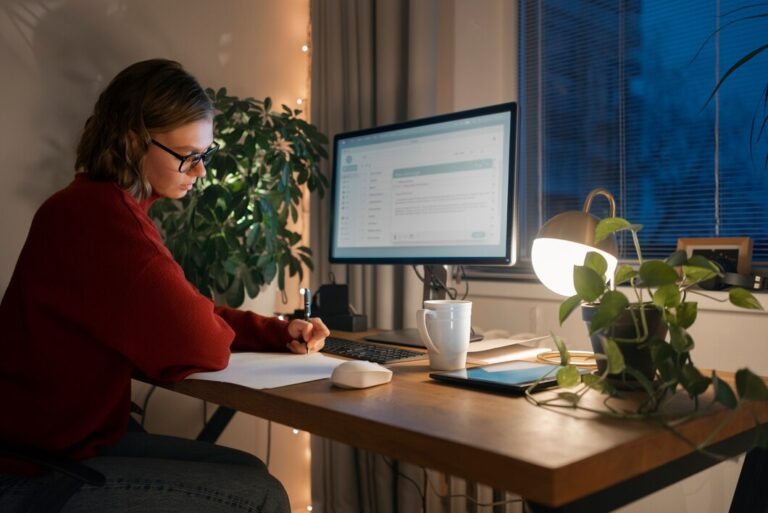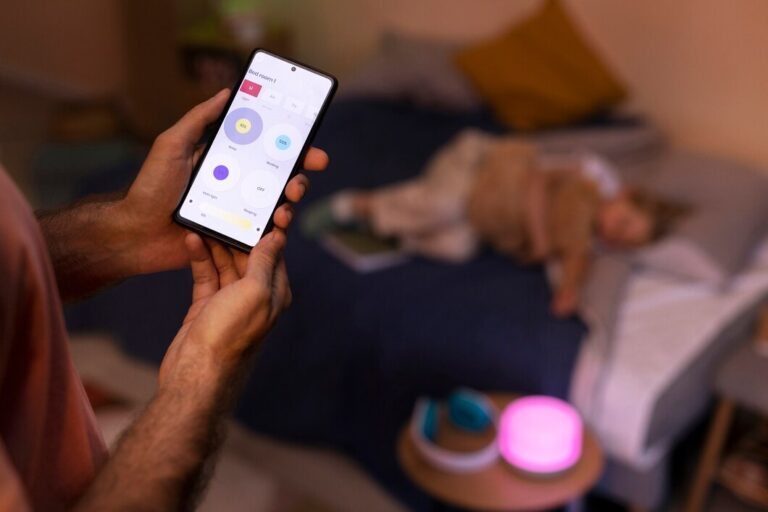
Is your home overflowing with old charging cables? Do you worry about the endless scroll and what it’s doing to your kids—and you? You’re not alone. In our hyper-connected world, managing our digital lives feels like a constant battle. But what if we told you the problem isn’t just about screen time? It’s about sustainability. In today’s connected world, the battle over screen time can feel constant. Quick fixes and sudden bans often backfire, leading to more conflict. The real solution lies not in temporary rules, but in creating Sustainable Digital Habits for Families.
This guide reveals what tech experts say about sustainable digital habits for families, providing a roadmap to a healthier relationship with technology for both your loved ones and the planet.
The digital world feels invisible, but its physical footprint is enormous. From the energy-guzzling data centers that power your Netflix marathons to the mountains of e-waste created by our constant need for the “next new thing,” our online habits have a tangible, and often damaging, impact.
This article will equip you with expert-backed strategies to transform your family’s digital consumption, reduce your environmental impact, and reclaim your time and attention from the demands of the digital age.

The Invisible Footprint: Why Digital Sustainability Matters Now
We often think of sustainability in terms of reusable bags and recycling bins. But have you ever considered the environmental cost of that email you just sent? Or the family’s shared photo library in the cloud? It’s time to pull back the curtain on the “invisible” world of digital consumption.
Tech experts emphasize that our digital footprint has two primary components: energy consumption and electronic waste (e-waste).
First, let’s talk energy. Every search, stream, and saved file is processed in a physical data center. These server farms are massive, warehouse-sized buildings packed with computers that run 24/7.
According to some estimates, data centers account for nearly 2% of global electricity consumption, a figure comparable to the entire aviation industry.
When you stream a movie in 4K, your device isn’t just using power; it’s pinging a data center that is using a colossal amount of energy and water for cooling. Think of it like this: leaving your digital life “on” all the time is like leaving the lights on in a thousand invisible rooms.
Then there’s the ever-growing mountain of e-waste. The global push for the latest smartphone or tablet has created a culture of disposability. The UN reports that a record 62 million tonnes of e-waste was produced in 2022 alone, and only a fraction of it was properly recycled.
These discarded devices are filled with valuable materials like gold and cobalt, but also toxic substances like lead and mercury that can leach into our soil and water. The constant upgrade cycle, often pushed by planned obsolescence, is a key driver of this crisis.
Key Points:
- Massive Energy Use: Data centers powering our cloud storage and streaming services have a significant global energy footprint.
- Growing E-Waste Crisis: The desire for new devices contributes to millions of tonnes of toxic electronic waste each year.
- The Cost of Convenience: Our “always-on” digital culture has hidden environmental and resource costs that families need to address.
“Consume Mindfully, Create Intentionally”: The Core Philosophy
To tackle this problem, experts propose a fundamental shift in our mindset. Instead of being passive consumers of digital content, we must become intentional curators of our digital lives.
Dr. Cal Newport, a prominent voice in digital minimalism, argues for a philosophy where you focus on a small number of digital activities that strongly support the things you value, and happily miss out on everything else.
Think of your family’s digital consumption like your diet. You wouldn’t let your kids eat junk food for every meal, would you? Similarly, a diet of endless, low-quality digital “junk”—mindless scrolling, clickbait articles, auto-playing videos—leaves us feeling mentally sluggish and unfulfilled.
A sustainable digital diet, on the other hand, is about choosing high-quality, nourishing content that aligns with your family’s goals and values.
This means asking critical questions before you engage:
- Does this app genuinely improve my life or my family’s connection?
- Is this screen time activity creative and active, or passive and consumptive?
- What is the purpose of picking up my phone right now?
Adopting this philosophy is a “pattern interrupt” to the hypnotic pull of modern technology. It moves your family from a reactive state—constantly responding to notifications and algorithmic suggestions—to a proactive one. You decide how and when technology serves you, not the other way around. This isn’t about rejecting technology; it’s about mastering it.

Tweetable Quote: “A sustainable digital diet is about choosing high-quality, nourishing content that aligns with your family’s goals and values, instead of binging on digital junk food.”
What Tech Experts Say About Sustainable Digital Habits for Families: A 3-Pillar Framework
Experts often break down the path to digital sustainability into a practical, three-part framework. By focusing on these pillars, you can create a comprehensive plan that addresses everything from your carbon footprint to your mental well-being.
Pillar 1: Tame Your Data Consumption
Your data usage is directly linked to energy consumption. The more data you stream, download, and store, the harder data centers have to work.
- Actionable Steps:
- Lower Streaming Quality: Do you really need to watch that YouTube video on your phone in 4K? Switching to Standard Definition (SD) can reduce its energy footprint by over 80%.
- Download, Don’t Stream: For music or podcasts you listen to repeatedly, download them over Wi-Fi once instead of streaming them multiple times over a cellular network.
- Clean Your Cloud: Treat your cloud storage like a physical closet. Regularly delete old, unnecessary files, blurry photos, and outdated backups. This reduces the long-term energy burden.
- Embrace “Digital Sunsets”: Set a specific time each evening (e.g., 9 PM) when all family devices are turned off, not just put to sleep. This includes your Wi-Fi router, which is a significant “vampire power” drain.
Pillar 2: Extend Device Lifespan
The most sustainable device is the one you already own. Fighting the urge to upgrade is a powerful act of environmental stewardship.
- Actionable Steps:
- Embrace the Repair Culture: Before replacing a device with a cracked screen or a weak battery, look for a local repair shop. Supporting the “right to repair” movement is crucial.
- Buy Refurbished: When you do need a new device, consider high-quality refurbished products. They are cheaper, work just as well, and prevent a perfectly good device from ending up in a landfill.
- Use Protective Cases: This one is simple but effective. A good case and screen protector can dramatically extend the life of a phone or tablet, especially in the hands of kids.
- Perform Digital Maintenance: Just like a car, your devices need tune-ups. Regularly clearing your cache, deleting unused apps, and managing storage can keep them running smoothly for longer.
Pillar 3: Educate and Empower
Sustainable habits are only effective if the whole family is on board. This is about education, not just enforcement.
- Actionable Steps:
- Lead by Example: Your kids are watching you. If you’re glued to your phone at the dinner table, no amount of rules will feel authentic. Model the behavior you want to see.
- Frame it as “Tech Hygiene”: Just like dental hygiene, tech hygiene is about small, daily habits that prevent bigger problems down the line.
- Make it a Family Project: Use a carbon footprint calculator to estimate your family’s digital impact and set a collective goal to reduce it.
- Teach Digital Literacy: Explain why you’re setting these boundaries. Talk about data centers, e-waste, and the psychological tricks apps use to hold our attention.
Taming the E-Waste Dragon: Your Family’s Action Plan
Let’s get tactical. That drawer full of old phones and mystery chargers isn’t just clutter; it’s a miniature environmental hazard. Creating a clear, simple system for managing your family’s electronics from purchase to disposal is one of the most impactful things you can do.
The Family Device Lifecycle Plan
- The “One In, One Out” Rule: For every new device that enters the home, one old device must be responsibly dealt with. No exceptions. This prevents the slow accumulation of e-waste.
- Create a Centralized “Tech Drawer”: Designate one spot for all tech-related items: chargers, cables, adapters, and devices that are currently “on deck” for repair or recycling.
- The Annual E-Waste Audit: Once a year, go through the Tech Drawer as a family. Sort items into three piles:
- Keep: Still in regular use.
- Repair/Donate: Broken but fixable, or old but still functional. These can be repaired or wiped clean and donated to charities.
- Recycle: Broken beyond repair or too old to be useful.
- Find a Certified E-Waste Recycler: Do not throw electronics in the regular trash. This is critical. Use online locators to find certified e-waste recycling centers in your area that will safely extract materials. Many electronics retailers also offer take-back programs.
Checklist for Responsible Device Management:
- Before buying new, can the old device be repaired?
- If buying, have we considered a refurbished model?
- Does the new device have a protective case and screen protector?
- Have we identified a certified e-waste recycler near us?
- Before recycling or donating, has all personal data been securely wiped from the old device? (Perform a factory reset).
- Have we established a “One In, One Out” policy as a family?
Beyond the Screen: Cultivating Digital Wellness and Connection
Sustainable digital habits aren’t just about kilowatts and kilograms. They are fundamentally about human sustainability. The ultimate goal is to use technology to enhance our lives, not detract from them.
Experts on digital wellness stress that chronic, low-grade distraction erodes our ability to focus, think deeply, and connect with the people right in front of us.
This is where the concept of digital boundaries becomes paramount. An open loop in storytelling keeps you reading; an open loop on your phone, with its endless notifications and infinite scroll, keeps you hooked at the expense of your real life. The key is to consciously create closed loops.
Strategies for Reclaiming Family Attention:
- Tech-Free Zones: Designate physical areas in your home, like the dining room or bedrooms, where no screens are allowed. This creates sanctuaries for conversation and rest.
- The “Welcome Home” Basket: Place a basket near the front door where everyone—parents included—deposits their phones when they get home. This creates a buffer between the outside world and family time.
- Schedule “Do Nothing” Time: In our hyper-productive world, boredom is a lost art. Schedule time for unstructured play and quiet reflection, free from any digital input. This is where creativity and self-discovery happen.
- Curate a “Joyful Tech” List: Work with your family to identify the technology uses that bring genuine joy and connection. Is it video-calling grandparents? Using a stargazing app together? Watching a family movie on Friday night? Prioritize these high-value activities and be ruthless about cutting out the rest.
By focusing on what you gain—deeper focus, better conversations, more creative kids—rather than what you’re “giving up,” you can frame these changes as a positive step towards a more fulfilling family life.
Frequently Asked Questions
What are the first steps to creating sustainable digital habits for families?
The best first step is to have a family conversation. Don’t just impose rules. Start by tracking your habits for a week to see where your time and energy are going. Then, pick one small, manageable change to implement together.
A great starting point is cleaning out your cloud storage or setting your video streaming to SD by default. Success with one small habit builds momentum for bigger changes.
How can I explain the importance of sustainable digital habits for families to my kids without scaring them?
Use relatable analogies. Compare data centers to a car engine that’s always running, or e-waste to throwing away a toy that could have been fixed.
Frame it as being a “tech superhero” or a “digital detective” who is smart about how they use their powers. Focus on the positive outcomes, like having more energy for the planet and more time for fun family activities.
Do sustainable digital habits for families really make a difference to the environment?
Absolutely. While individual actions can feel small, collective change has a massive ripple effect. When millions of families reduce their streaming quality, delay their phone upgrades, and recycle their devices properly, it sends a powerful message to manufacturers and service providers.
It reduces the demand on data centers, conserves precious resources, and cuts down on toxic waste. Your family’s choices are a vote for a more sustainable tech industry.




